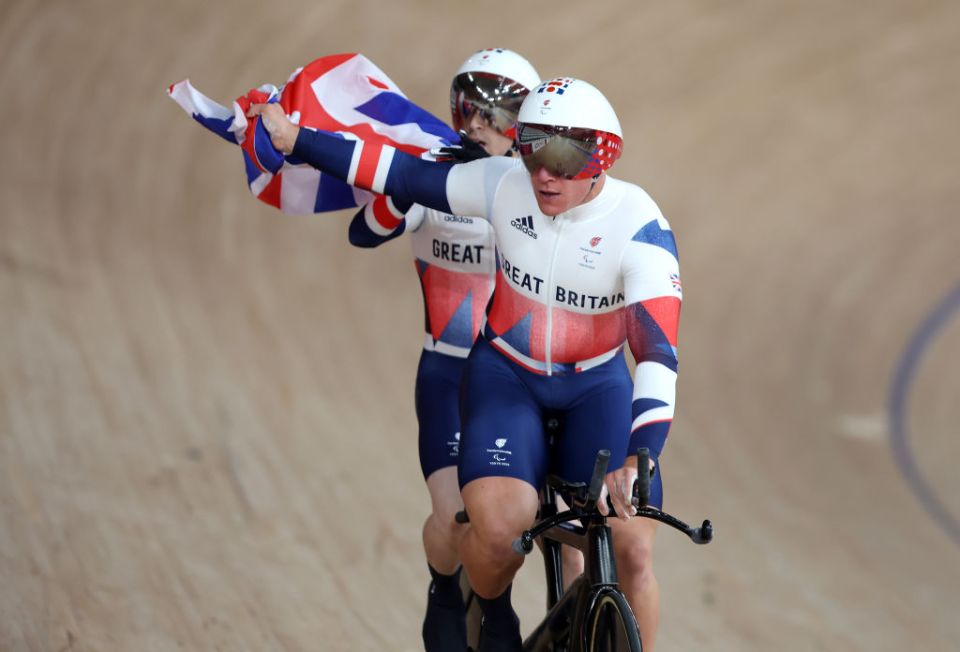How Neil Fachie found Paralympic glory after ditching running track for velodrome

Since he first jumped on a mountain bike in the north-east of Scotland, cycling has been Paralympic champion Neil Fachie’s one-way ticket to freedom.
That Fachie is now the owner of two Paralympic gold medals and 19 world titles doesn’t do justice to a complex sporting journey that was never guaranteed to bend in a triumphant direction.
As he prepares to defend his Tandem B Kilo title in Paris over the coming days, Fachie has never lost the magic of what it means for someone with near-total blindness to be on two wheels.
“It’s quite easy for people with disabilities to be packed into taking the safe option always,” said Fachie.
“Cycling has opened me up to the freedom to explore the world and give me the confidence as a person to express myself, to go out and take on the world to be honest.”
Born in Aberdeen, Fachie’s youth was spent riding a mountain bike in the rural areas around the Granite City and finding any outlet that he could.
“I was one of those kids with too much energy,” said Fachie. “I was very much shepherded into sport. I was very competitive when I was young – everything was a sport to me.”
Fachie found athletics at the age of 10, joining Aberdeen Amateur Athletics Club and revelling in the joy of being physically active.
“Running gave the motivation and outlet that I needed,” said Fachie. “It was simplistic and a great way of burning off energy.
“I was sporty, but I wasn’t particularly successful when I was young. I enjoyed pushing myself and the social aspect, but I never really saw myself competing on the international stage, as much as I might have dreamt it.”
Fachie competed in non-disabled events for well over a decade and only became aware of para sport in 2005, testing the water at the World Para Athletics Championships in 2006.
Two years later, he was in the blocks at the 90,000-seater Bird’s Nest stadium in Beijing, waiting for the starting gun to fire in the 100m.
“It wasn’t until I arrived that I realised how massive the Paralympics actually were,” said Fachie. “It was all overwhelming. I saw all of these apartment blocks with national flags draped from them, people from all across the globe all with different disabilities, this hugely diverse place.
“That was when I fell in love with the Paralympics.”
It was a bittersweet experience for Fachie, who finished ninth in the 100m and 200m, results that forced him back to the drawing board when it came to his sporting future.
At that point, Fachie’s family encouraged him to move on from his athlete life and he went to the Job Centre to sign on. “Iit was a proper low point,” he said.
Feeling like he had nothing to lose, the lifelong track cycling fan went to a velodrome taster session in November 2008, travelling seven hours on the train from Aberdeen to Manchester.
That day, a chance encounter with a fellow Scot changed everything.
Craig MacLean, Olympic sprint silver medallist at Sydney 2000, was in the midst of moving to become a pilot on a tandem and aiming for the Paralympics.
After spotting Fachie’s Beijing rucksack, MacLean told him the team were desperate to find a visually impaired athlete to sit on the back, as a stoker.
“It was meant to be really and it turned out cycling was the sport I should have been doing all along,” said Fachie.
“Since then, it’s been a long journey of losing many races and turning a hobby into a career.”

He is now one of the most dominant riders in para cycling history and the first man to ride the 1km time trial in less than a minute.
Fachie’s Paralympic journey has been inspired by one of Britain’s greatest-ever Olympians.
‘‘Chris Hoy was an inspiration even before I got involved in cycling,” said Fachie. “He was highly thought of in Scotland and the UK and I was fortunate that I got to train alongside him from 2009 till after 2012.
‘‘He is the most down to earth, hardworking guy, he was willing to chat and help anyone out. He showed that you could be that level of an athlete but still be very normal with it.
‘‘He doesn’t get carried away by it. When I switched from athletics to cycling, I thought if he is able to work so hard, I should be too. He was a real inspiration.’’
With more than £30m a week raised for Good Causes, including vital funding into elite and grassroots sport, National Lottery players support our Olympic and Paralympic athletes to live their dreams and make the nation proud, as well as providing more opportunities for people to take part in sport. To find out more visit: www.lotterygoodcauses.org.uk